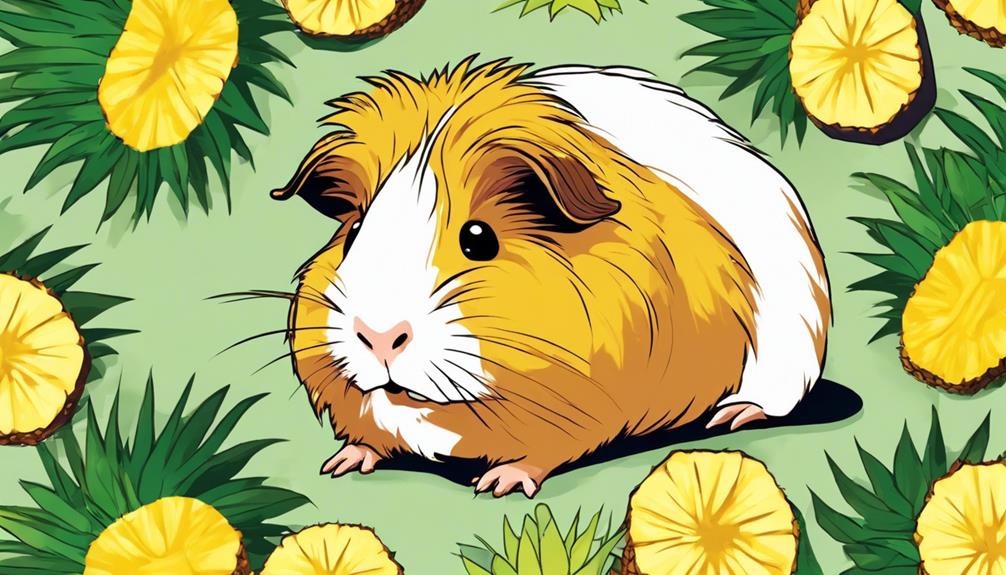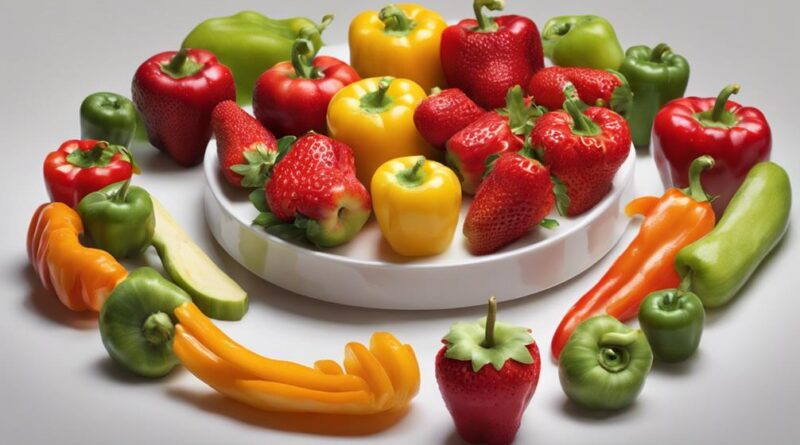Top Healthy Fruits for Your Guinea Pig's Diet
Did you know that guinea pigs are unable to produce their own Vitamin C, making it crucial for their diet to include fruits rich in this essential nutrient?
When considering the best fruits for your guinea pig, it's important to choose wisely to ensure their health and well-being.
As you explore the top healthy fruits for your furry friend, you'll uncover a variety of options that not only provide necessary vitamins and minerals but also add some excitement to their daily menu.
Apple
When feeding your guinea pig apples, ensure you remove the seeds and core first to prevent any potential health risks. Apples are a tasty treat that can be a great addition to your guinea pig's diet when given in moderation. They're a good source of fiber, vitamin C, and antioxidants, which can help support your pet's overall health. However, like any fruit, apples should be given in moderation due to their sugar content. A couple of small apple slices a few times a week should be sufficient.
There are various apple varieties to choose from, but it's essential to pick ones that are fresh and free from pesticides. Some guinea pigs may have preferences for sweeter varieties like Gala or Fuji apples, while others may enjoy the tartness of Granny Smith apples. It's a good idea to experiment with different types to see which ones your guinea pig prefers.
When offering apples to your guinea pig, remember that variety is key in maintaining a balanced diet. Along with apples, make sure to provide a mix of other fruits and vegetables to ensure your pet receives all the necessary nutrients. By following these guidelines and feeding apples in moderation, you can treat your guinea pig to a healthy and delicious snack.
Banana
To introduce bananas into your guinea pig's diet, make sure to peel them and cut them into small, bite-sized pieces to prevent choking hazards. Bananas are a tasty treat that can provide your furry friend with essential nutrients. Here are some reasons why you should consider adding bananas to your guinea pig's diet:
- Banana treats: Guinea pigs often enjoy the sweetness of bananas as a special treat.
- Nutritional benefits: Bananas are a good source of vitamin C, which is crucial for your guinea pig's overall health.
- Potassium: Bananas are rich in potassium, an important mineral that helps regulate heart function.
- Digestive health: The fiber in bananas can aid in digestion and prevent constipation in guinea pigs.
- Energy boost: The natural sugars in bananas can provide a quick energy boost for your active guinea pig.
Remember to offer bananas in moderation as they're high in sugar. Including a small portion of banana as an occasional treat can add variety to your guinea pig's diet and keep them happy and healthy.
Blueberries
Blueberries are a vibrant and nutritious addition to your guinea pig's diet. These tiny fruits are packed with essential vitamins and antioxidants that can benefit your furry friend's health. Blueberries provide vitamin C, which is crucial for guinea pigs since they can't produce it on their own. Additionally, the antioxidants in blueberries help boost their immune system and promote overall well-being. However, moderation is key when feeding blueberries to your guinea pig due to their sugar content. While guinea pigs can enjoy the occasional treat of blueberries, it's essential to limit the serving size to prevent digestive issues.
When offering blueberries to your guinea pig, be cautious of potential choking hazards. Make sure to cut the blueberries into small, manageable pieces to reduce the risk of choking. Wash the blueberries thoroughly to remove any pesticides or chemicals before serving them to your pet. Remember that blueberries shouldn't replace their regular diet but should be offered as a healthy snack in limited quantities.
Strawberries
Strawberries are a delicious and nutritious fruit option for your guinea pig's diet. These bright red berries are packed with essential nutrients that can benefit your furry friend's health. Here are some key points to consider when adding strawberries to your guinea pig's menu:
- Strawberry nutrition: Strawberries are rich in vitamin C, which is vital for guinea pigs as they can't produce this vitamin themselves. Additionally, they contain fiber, antioxidants, and other essential vitamins and minerals that promote overall well-being.
- Benefits for guinea pigs: The nutrients in strawberries can help boost your guinea pig's immune system, improve digestion, and contribute to healthy skin and coat.
- Tips for feeding strawberries to guinea pigs:
- Introduce strawberries gradually to avoid digestive upsets.
- Offer strawberries as occasional treats, not as a primary food source.
- Wash strawberries thoroughly to remove any pesticides or dirt.
- Remove the green leafy tops and cut the berries into small, bite-sized pieces to prevent choking hazards.
- Monitor your guinea pig for any signs of allergies or sensitivities after feeding them strawberries.
Oranges
When considering fruits to add to your guinea pig's diet, oranges provide a refreshing and nutritious option. Oranges are a great source of Vitamin C, an essential nutrient for guinea pigs. This vitamin helps boost their immune system, aids in the absorption of iron from plant-based foods, and promotes overall health. Guinea pigs, unlike humans, can't produce their own Vitamin C, so it's crucial to include it in their diet. Oranges offer a tasty way to ensure your furry friend gets an adequate amount of this vital vitamin.
Feeding oranges to your guinea pig should be done in moderation due to their high sugar content. While oranges are a healthy treat, too much can lead to digestive issues or weight problems. Offer a small slice of orange as an occasional snack, not as a daily staple. A couple of times a week is a good frequency to give your guinea pig this citrusy delight. Remember, a balanced diet that includes a variety of fruits and vegetables is key to keeping your guinea pig happy and healthy.
Kiwi
To add variety to your guinea pig's diet after considering oranges, kiwi can be a flavorful and nutritious option to explore. Kiwi benefits your furry friend in various ways, offering a tasty treat while also contributing to their overall health. Here are some key points to keep in mind when it comes to kiwi feeding and your guinea pig's well-being:
- Rich in Vitamin C: Kiwi is packed with Vitamin C, which helps boost your guinea pig's immune system.
- Dietary Fiber: The fiber in kiwi promotes healthy digestion for your pet.
- Antioxidant Properties: Kiwi contains antioxidants that can aid in reducing inflammation.
- Hydration: Kiwi has a high water content, which helps keep your guinea pig hydrated.
- Moderation is Key: While kiwi treats are beneficial, remember to offer them in moderation to maintain a balanced diet for your guinea pig.
Pineapple

Indulge your guinea pig with a refreshing taste of pineapple, a juicy and vitamin-rich fruit that can be a delightful addition to their diet. Pineapple is a tropical treat that not only adds variety to your pet's meals but also offers a range of health benefits. This sweet fruit is a vitamin-packed snack that contains essential nutrients to support your guinea pig's well-being.
Feeding your guinea pig small amounts of pineapple as an occasional treat can be a great way to introduce a new flavor to their diet. Pineapple is rich in vitamin C, which is crucial for guinea pigs as they're unable to produce this vitamin on their own. Vitamin C helps boost their immune system and promotes overall health.
When offering pineapple to your guinea pig, ensure that it's fresh and ripe. Avoid canned or preserved pineapple, as these may have added sugars or preservatives that aren't suitable for your pet. Remember that moderation is key, as the high sugar content in pineapple can be harmful in large quantities.
Introduce pineapple slowly into your guinea pig's diet to observe how they react to this new fruit. Watch for any signs of digestive issues or allergies. By incorporating pineapple as an occasional tropical treat, you can provide your guinea pig with a vitamin-packed snack that adds a burst of flavor to their daily meals.
Watermelon
Savor the juicy sweetness of watermelon as a hydrating and delicious addition to your guinea pig's diet. When feeding your fluffy friend this treat, opt for the seedless variety to ensure it's safe for consumption. Remember, as with any fruit, moderation is key due to its high sugar content.
Here are some essential points to consider when including watermelon in your guinea pig's diet:
- Seedless Variety: Choose seedless watermelon to prevent any choking hazards for your guinea pig.
- Hydration: Watermelon is a great source of hydration for your pet due to its high water content.
- Vitamins and Antioxidants: This fruit contains essential vitamins like vitamin C and antioxidants that can benefit your guinea pig's health.
- Fiber: Watermelon contains fiber that can aid in digestion for your furry companion.
- Moderation: While watermelon can be a tasty treat, remember to feed it to your guinea pig in moderation due to its high sugar levels.
Frequently Asked Questions
Can Guinea Pigs Eat the Seeds of the Fruits Mentioned in the Article?
Yes, guinea pigs shouldn't eat seeds from fruits. Seed safety is crucial for their digestive health. While some seeds may offer nutritional value, they can also pose digestive concerns, potentially leading to blockages.
Stick to dietary recommendations that exclude seeds to keep your guinea pig healthy and happy. Seedless fruits like apples and bananas are safer options for their diet.
How Often Should Guinea Pigs Be Fed These Fruits?
When considering the feeding schedule for your guinea pig, it's crucial to meet their nutritional needs through a balanced diet. Incorporate fruits occasionally to add variety, ensuring you offer them in small portions to prevent overeating. Maintaining a diverse diet that includes healthy fruits will contribute to your guinea pig's overall well-being.
Are There Any Fruits That Should Be Avoided for Guinea Pigs?
When it comes to fruits for your guinea pig, some should be avoided due to nutritional concerns and potential digestive issues. Citrus fruits like oranges and lemons can be too acidic for their sensitive tummies.
Also, fruits high in sugar, like grapes and bananas, should be given sparingly to prevent health issues.
Always prioritize fruits that are safe and beneficial for your furry friend's well-being.
Can Guinea Pigs Eat the Peel or Skin of the Fruits Listed?
When it comes to guinea pigs, it's best to avoid giving them the peels or skins of fruits. While some peels may contain nutrients, they can also be hard for your furry friend to digest.
Always remove the peels before offering fruits to your guinea pig to ensure their safety and well-being. Sticking to the flesh of the fruit will provide them with the necessary nutrients without risking any digestion issues.
Are There Any Specific Health Benefits for Guinea Pigs When Consuming These Fruits?
Eating fruits provides your guinea pig with digestive benefits and essential vitamins. These nutrients can aid in maintaining a healthy digestive system and support overall well-being.
Incorporating a variety of fruits into your guinea pig's diet can help ensure they receive the necessary vitamins to thrive. Remember to introduce new fruits gradually and monitor their reactions to ensure they're benefiting from these healthy treats.
Conclusion
In conclusion, feeding your guinea pig a variety of healthy fruits like apples, bananas, blueberries, strawberries, oranges, kiwi, pineapple, and watermelon can provide them with essential nutrients and vitamins.
Remember to offer these treats in moderation to prevent digestive issues. Your furry friend will surely appreciate the tasty and nutritious additions to their diet.
Keep their diet balanced and diverse to ensure a happy and healthy guinea pig!
